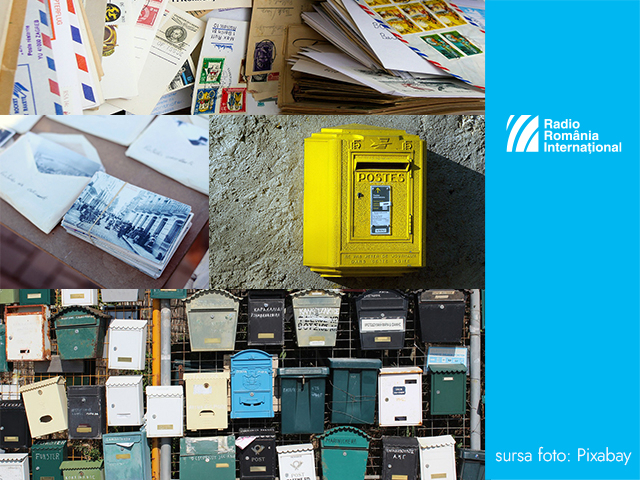Mail Roundup – May 23, 2023
A roundup of messages we've received in the last two weeks

Vlad Palcu, 23.05.2023, 13:01
Hello everyone!
May is almost at
an end, with its lovely scents and cool breeze. After a rainy couple of weeks,
the weather is picking up, to the extent that we’re looking at average
temperatures in the high twenties. With bright and warm days ahead, we are also hoping reception conditions will improve in the region and everyone else, as many of you have signalled a number of related issues.
***
A word of
appreciation goes to Akira Takei (Japan) who just wrote in to say he loves
listening to our Simply Folk show devoted to Romanian traditional music. We know many of other listeners in your region enjoy our folk segments, which is why we have a 3-minute slot devoted to this genre on a daily basis.
***
A nice greeting
also came from Cyril MacDonald (Canada), who wrote: By the way, I love the
traditional and modern music played on RRI as well as the very informative
cultural reports frequently heard. I also greatly appreciate the beautiful QSL
cards and stamps from Romania. Keep up the great work! Thanks, Cyril, your words mean a lot!
***
Mei Lin (China) wrote to us, commenting
on the recent WHO report concerning the COVID-19 pandemic.
The World Health
Organization declared that the COVID-19 epidemic no longer constitutes a
public health emergency of international concern, which indicates
that one of the most deadly and economically destructive epidemics in modern
history is fading, because the disease that caused the epidemic has become a
routine disease.
The
WHO said on the 5th that Covid-19 still exists, but the downward trend of the
pandemic has been going on for more than a year because people everywhere have
established immunity to the virus. The mortality rate has decreased, and the
pressure on the health system has also been reduced. These trends have enabled
most countries to return to pre-epidemic life, although COVID-19 is still
spreading.
This
is a moment worthy of celebration and reflection. The world has made sacrifices
to fight this virus and established new systems and technologies. However, the
lack of global coordination, fairness and solidarity means that resources have
not exerted their maximum potential and lost lives that should not have been
lost.
Covid-19
has changed our world and also changed us. But I believe that after this
experience, all of us will become better!
It is as you say, Mei – the COVID
has been a terrible experience for all of us, but together we have emerged
stronger and are now moving forward.
***
On the first Sunday of May we marked
World Laughter Day. On this occasion, Bidhan Chandra Sanyal (India) shared with
us more information about this event.
There is no substitute for laughter, be it for
yourself or for others. There is no better medicine in this world than
laughter. When you smile, the mind and body are all good. Improves
mood and reduces physical pain. Laughter relieves any mental
thoughts. So this World Laughter Day is undoubtedly a special day.
But since when and why was this special day introduced?
World Laughter Day is celebrated
on the first Sunday of May every year. In 1963, Harvey Ball first created
the smiley symbol for some commercial reasons. After that, this sign
became popular to signify something good or encourage.
World Smile Day was first
celebrated in 1999 with that symbol in front. And after Harvey’s death in
2001, the day is commemorated annually by the World Smile Foundation.
However, it is known from another source that Dr. World Laughter Day was
first launched in 1998 by Madan Kataria.
World Laughter Day was first
celebrated in India. It was started on 10 May 1998 in the city of Mumbai,
India by Dr. Madan Kataria, the founder of the global laughter yoga
movement. Dr. Kataria, a family doctor, was inspired to start the Hasi
Yoga movement out of an interest in knowing how a person’s emotions are
affected by facial expressions or reaction projections.
To celebrate the World
Laughter Day and to keep good spirits, many laughter clubs are created around
the world. These types of clubs usually organize various entertainment
programs like singing, dancing and laughing contests. Also Ho ho,
ha-ha-ha and Very good, very good, ya! etc. is shouted
over and over again, which gradually turns into laughter.
The information is much appreciated, as always Bidhan.
Thanks for sharing with us special events like this every week. Today may not
be World Laughter Day, but we still take this opportunity to share with you
this classic joke. It’s, as they say, an oldie but goldie J
A bear walks into a bar and says, Give me a whiskey
and … a Coke.
Why the big pause? asks the bartender. The bear
shrugs. I really don’t know, I was born with them.
***
This week we got
an interesting message from Dan Jameson (England), who wrote to us after a long
time. Here is a part of his message below:
Have not DX’ed for a long time, so when
patiently waiting for the broadcast to come on air, I was a little disappointed
not to hear any call sign
Top of the news was talking about the Romanian
governments emergency order on public spending, and then that of the coronation
of King Charles (isn’t that a spaniel?) III, here in England.
Ana Maria Popescu’s section on the Sunday show
regarding alternative music in Romania was interesting, as alternative music is
something that appeals to myself.
Mainstream music is overrated!
The interview with Romanian band Black
Lily’s was another interesting feature, to hear how English music and
culture has impacted Romanian culture was surprising. I just hope it stops at the level of music,
and that that Romanian Orthodoxy dominates Romanian culture deeply.
Due to the range in broadcast audio quality, it was
hard to clearly here some points, examples being that I couldn’t make out the
second word of the band’s name (Lily’s) and the song played from the album
New Era came across as Invisible dreams not the correct
title Invisible Strings…..luckily, Google was at hand. I have saved a track from the band on my
‘watch later’ list on YouTube.
All in all, the broadcast was very musical. From alternative, through jazz and into folk
music at the end. Sadly, not a fan of jazz
myself and folk music in another language is a hard listen in my humble
opinion.
I’m looking at making DX’ing and your station a staple
of my listening (and learning). I’m surprised just how many shortwave stations
have disappeared since the internet age, but good to know RRI are still on the
dial.
Thank you, Dan.
Sometimes we wonder the same thing ourselves, and yet hopefully our work
continues J Don’t be a stranger!
***
Michael Naven
(USA) has also recently written, describing reception conditions for his
frequency and adding the following comment:
Your program was informative and
professional as usual. I don’t seem to be able to pick up your west coast
English broadcast any more but the French and Spanish ones come in well. (Hablo
un poco de espanol.) I had 4 years of Spanish in high school. But My knowledge
of French is very limited. All these languages, Portuguese, Italian, Spanish,
French, including Romanian, are from Latin and have certain words in common.
But English is from an old dialect of German brought to the British Isles by
the Saxon invaders. The world speaks over 300 languages. Confusing enough? I
think so. But it’s very interesting. Keep up the good work!
Thanks Michael,
and keep practicing your Spanish J There’s
actually a famous series of parodies about Americans learning Spanish, here is
the link
https://www.youtube.com/watch?v=4cKGyOE_jOI
***
We also greet
Dahmani Rachid (Algeria), who again sent us a nice message.
My friends and loved ones at Radio Romania’s
English section
Greetings of love and appreciation to all of you.
I hope this letter finds you well. I am writing to
express my heartfelt gratitude for the exceptional programming that your radio
station consistently delivers. As an avid listener, I have been captivated by
the diverse range of shows and the immense value they bring to my everyday
life.
Your dedication to providing varied radio programs is
truly commendable. The thoughtfulness and effort put into curating a diverse
lineup of shows have not gone unnoticed. Whether it’s the enlightening talk
shows, the uplifting music selections, or the engaging interviews, each program
offers a unique and enriching experience.
I would like to extend my appreciation to the talented
hosts and presenters who bring these programs to life. Their expertise,
charisma, and passion shine through in every broadcast. They have a remarkable
ability, and I find myself eagerly tuning in to their shows whenever possible.
One aspect that stands out to me is the quality of the
content. The depth of research, attention to detail, and the ability to explore
a wide range of topics with depth and nuance is truly impressive.
Moreover, I want to express my gratitude for the
positive impact your radio programs have had on my life. your programs have
become an integral part of my daily routine.
please convey my thanks and appreciation to all the
individuals who contribute to the success of your radio station. Their hard
work, creativity, and dedication are sincerely appreciated. I am really
grateful for the programs that your radio station constantly provides.
I look forward to continuing my journey as a loyal
listener and being inspired by the incredible shows your radio station has to
offer.
Thank, you,
Rachid. Your words of appreciation are an inspiration to us. Thank you for
being our loyal listener.
***
From the USA,
Tim Brockett also wrote in to greet us and tell us how much he enjoyed our
programmes. Thank you for continuing to broadcast wonderful shows on shortwave. My
friends and I enjoy listening.
Thanks, Tim, it was good to hear from you.
***
We also say
hello to Teruhiko Kachi (Japan), who also caught up with our broadcasts this
week and sent us the following message:
Of the recent programmes, I
was particularly interested in The History Show which aired earlier
this month on the Latinity of the Romanian people. I have learnt
that Romania has its origins in Rome, but has adopted a diverse range of
languages, religions, music, and other cultures. I am not a nationalist, and I
dislike extreme chauvinism. However, I often think about what a
nation is. Of course, language is not the only thing that characterizes
an ethnic group, but I am sure that language is also the most important
aspect of ethnic identity. In any case, the programme gave me various
suggestions. I look forward to hearing more programmes like this in the future.
Thanks, Teru.
Indeed, this is a topic for a broader debate into the constituents of national
identity, which vary across cultures and are highly specific for each nation.
We’re glad you enjoyed the programme.
***
It’s now time to
thank all the other listeners who took the time to send us messages over the
last two weeks. We appreciate the effort and are grateful to each and every one
of you. Many thanks to Alan Gale (UK), Najim Uddin (India), Ratan Kumar Paul
(Pakistan), Chris Malboeuf (Canada), Jaouad
Saber (Morocco), Ian Morrison (China), Cyril MacDonald (Canada), Hiroshi
Katayama (Japan), Hiromichi Kinoshita (Japan), Hiroshi Katayama, Mei Lin
(China), Michael Naven (USA), Saleem Chadhar (Pakistan), Malik Allah Bachaya
(Pakistan), Madhab Chandra Sagour (India), Jakub Denisiuk (Poland), Francis
Lawlor (Ireland), Paul B. Walker, Jr. (USA), Najim Uddin (India), Ratan Kumar
Paul (India), Richard Lemke (Canada), Tomasz Kotas (Poland), Debakamal
Hazarika (India), Michael Andersson (Sweden), Joandric Ávila Fernández (Costa
Rica), Sakae Onozawa (Japan), Abdul Aleem (India).
I know many of you are still asking when the QSLs for
2023 will arrive. We still have no word from our letters’ department, but we
hope to get them this summer. Meanwhile, we assure you every report you send
will be logged and marked for a QSL card as confirmation.
Wishing everyone a great week ahead, 73!





























